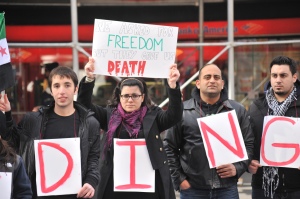Some words in favor of egotism
I usually refer to egotism when people ask me about the most important thing for being a writer. The term seems to be very confusing as people usually associate it with selfishness, arrogance and pride. People with no writing career find it strange that a socially unfavorable characteristic is viewed as an essential trait for providing something good for our communities and hence the need to explain that unless somebody feels like a messenger s/he might not be able to pass on their message.
However, I find myself confronted with that question about the pride mentioned in the Holy Scripture as the primary sin. I always answer that question with yes and no. Yes, my pride is very similar to Satan’s, who refused to be a slave angel and wanted to lead a life of free choice no matter how many sins might be incurred. His pride led him to disobey his destiny and his creator, and to create by himself his own life. On the other hand, my pride is not a sin because I am not convinced that God or any other deity would be angry with my wish to create my own life or even to challenge him/them. It is not yet settled, even in philosophy, sociology and psychology whether humans can be free or their choices and achievements are natural reflections of their backgrounds. I guess, it is not yet settled even in theology whether God wants slaves to worship him or free people to complete his work. The latter would definitely necessitate the acknowledgment of self-confidence, self-belief and that aptitude for taking up challenges.
Another aspect of egotism: challenge
Confining my broad issue of pride and challenge to writing books, I remember a definition of writing as an attempt to recreate the world according to a certain set of different values. Most people would not probably see a challenge in coming up with a book or a great achievement, especially when these values correspond to those mentioned in the holy books. However, a friend of mine, who resides in Saudi Arabia, insists that writing a book is a real challenge directed towards Gods and goddesses: « A book distinguishes you from other passer-byes in life and makes you − like God − eternal », he says. It is right that some books are more challenging than others, and that actually most books are written to support the already established systems, but history highlights revolutionary and pioneering books and distinguish them from other kind of books. Moreover, people never stop creating prophets, messengers, and legendary figures out of those who are punished for their challenging books or ideas. Clearly, writing a challenging book is an act of creation or recreation, which gives their authors a status marked with homage, and shortens that distance between what is human and what is divine.
Classification of immigrants according to the paths of their egos
Taking the issue to the area of immigration, I do not tend to ascribe the difficulties of adaptation or integration to an excessive pride in one’s own origin or culture as I tend to think of this kind of collective pride as a channel of compensation for a thwarted ego. As far as I have experienced, I have seen that most immigrants fall in one of two main categories: first, those who cling to their own lobby and firmly adhere to their own cultures highlighting their original values and lifestyles. I have seen in this respect exaggerated practices of what had been roughly or hardly practiced in the countries of origin. For example, a Syrian friend of mine told me that the first time she wore hijab was in France. More surprisingly, I have seen and heard many cases of people who felt hurt and touched when their presidents or kings happened to be cursed or mocked in exile despite the fact that they used to mock and curse the same persons in their own countries. Moreover, there are immigrants who discover a sudden interest in sports in exile and go to stadiums to cheer for the national teams of their countries. Finally, I would say that I have seen a lot of posters of religious figures or verses inside Syrian houses, but the first time I saw a phrase like « I love Islam » on the outer door was outside Syria. I guess, this kind of pride gets intensified in the exile as it becomes an identity and these exaggerated practices are to defend a troubled and a threatened ego.
Moving to the second category of immigrants who do exactly the opposite and in many cases they get rid of all what can identify them as belonging to a certain culture or to a certain part of the world. In their pursuit of what I prefer to call social acceptance rather than integration, those immigrants go sometimes to extremes that go beyond changing practices and lifestyles to deserting families and friends in an attempt to disavow their past and make a new start. Tracing the path of pride or ego within this category could be more tortuous than the first category and therefore more difficult, but beyond doubt if one’s ego can be merely gratified with distance, separation and disavowal of the origin then it is a troubled one as well.
Another type of immigrants: immigrants in their own countries
It is worth mentioning that practices and people of the second category are not confined to immigrants but they can be found in the country of origin as well. These cases are widely found in postcolonial nations where a distance from the local culture is deemed essential for obtaining a higher status. Furthermore, the countries that have joined the European Union recently are expected to show such a tendency of self disavowal and taking pride of the other rather than the self. Similarly, Christians in Asia and Africa in general feel some kind of solidarity with Europeans and whites, and rejoice in that kind of collective pride in being European-like, which reveals in my opinion a deficiency complex. This leads me to touch on globalization and the impact of the most dominating cultures in the world: the Anglo-Saxcon culture and the francophone culture though the latter is viewed as a less dominating probably because it is threatened as well. All the above- mentioned phenomena are examples of collective pride found widely among people who have not yet had a successful multicultural experience.
Egoists are successful immigrants
A collective pride in general compensates for the lack of a personal pride or a satisfied ego, but it should not be taken strictly as an indicator of adaptability or inadaptability. On the other hand, those kinds of traits circulating around personal pride like self confidence, willpower and egoism are usually associated with resourcefulness, persistence, and resilience and therefore immigrants with these characteristics are more likely to succeed in their exile. Clearly, immigrants who have a balanced attitude towards either their origins or their new environments, and who could form a third category, are those who have satisfied their egos and developed critical thinking and independent characters either in their original societies or the new ones.
My personal pride
Coming back to what kind of pride I have, I address that question to myself! Thinking of what actually fills me with pride, I have found out that it is neither the country of my birth, Syria, nor the country where I reside, Switzerland. Moreover, my pride has nothing to do with my race, color, culture or nationality. More surprisingly, my pride has no bearing even to my remarkable achievement of academic degrees, published books or literary prizes. Thinking deeply of what makes me proud, I could not exclude the fact that I have sought my freedom and that I am unabatedly safeguarding it. Going deeper with the source of my pride, I could not deny being proud that my father’s blood is circulating all around my body! I mean it figuratively; of course, especially that he is the one who told me about the existence of other fathers. With remarkable patience, he tolerated my disobedience and only referred to what is written in books as much more valuable than what he says. He is the one who paved the way for my independence and free thinking by offering himself as the first target for my criticism. What I am proud of in particular is that I have inherited something of that spirit that is still enabling him to face poverty, social ills, depression, and unimaginable horror with incredible patience and an unrelenting wish to challenging reality and enabling humanity to go one step further.
Ibrahim Rami
Membre de la rédaction Neuchâteloise de Voix d’Exils.



